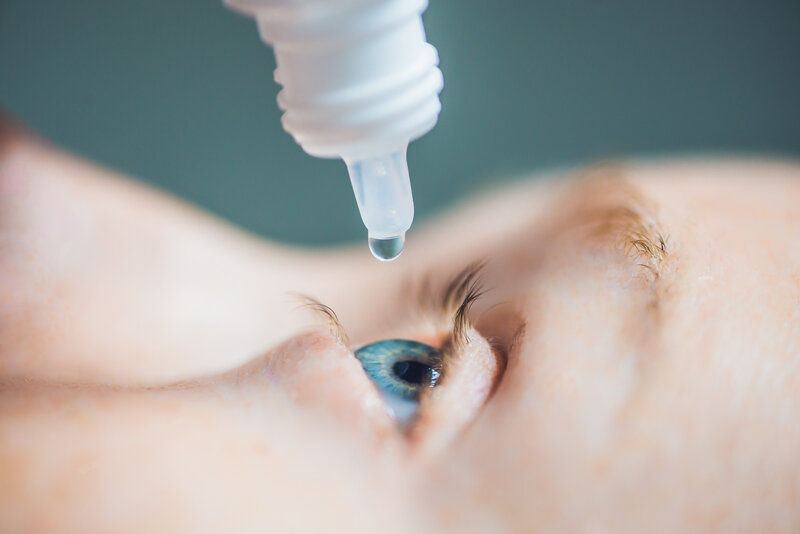Dry Eye Symptoms And Relief

The American Optometric Association (AOA) describes dry eye as “a condition in which a person doesn't have enough quality tears to lubricate and nourish the eye. Tears are necessary for maintaining the health of the front surface of the eye and for providing clear vision.”
Dry Eye Symptoms
While symptoms of dry eye are uncomfortable enough on their own (one of the ten most common causes of eye pain), chronic and untreated cases of dry eye lead to more serious issues. Those who have dry eye raise their risks of eye inflammation, abrasion of the corneal surface, corneal ulcers, vision loss, and more frequent eye infections.
Symptoms of dry eye include:
- A feeling that your eyes are dry
- A gritty or scratchy feeling
- Red eyes
- Excessive watering (contrary to what you might think, the irritation from dry eye causes excessive tearing at times)
- Light sensitivity
- Stringy mucus on the eye
- Blurred vision
You are more prone to dry eye if you are 65 years old or older, a woman, on medications that cause dry eye, use contact lenses or had Lasik surgery, or if you currently have an underlying health condition known to contribute to dry eye (autoimmune disorders, diabetes, thyroid issues).
Dry Eye Relief
The good news is catching dry eye early and immediately implementing dry eye treatment strategies, and you may not need anything more. If, however, these treatments don’t help or dry eye symptoms continue, schedule an appointment with your optometrist to get more professional treatment.
Here are seven things you can do to get relief from dry eye, reduce symptoms, and get rid of it altogether.
Keep hydrated, eat well, and get plenty of sleep
A healthy lifestyle is a foundation of eye health. Honoring the fundamentals of a healthy lifestyle can help minimize or prevent dry eye episodes. That includes things like:
- Eating an eye-healthy diet
- Exercising regularly
- Staying hydrated
- Being well-rested
- Reducing stress
Manage screen time and blink regularly
When we look at screens, we tend to blink far less than normal, contributing to dry eye. If you spend multiple hours per day using computers, tablets, or a smartphone, set boundaries and give your eyes a break. Set an alarm for every 15 to 20 minutes as a reminder to look away from the screen for at least a minute or so, preferably with a view outside or stepping outdoors to take a few deep breaths. Try to make blinking a part of our “screentime” routine to keep eyes hydrated, lubricated, and soothed.
Resist the urge to rub your eyes
As mentioned above, people with dry eyes are more prone to having scratched corneas. Excessive eye rubbing thins the cornea and makes it more vulnerable to scratches (corneal abrasions), which only intensifies dry eyes’ symptoms.
Use artificial (preservative-free) tears
Keep bottles of artificial tears (particularly those without additives or preservatives) in your purse, computer case, bedside table, TV-watching zone, etc. That way, you can add a few drops to soothe irritated eyes and keep them flushed and soothed.
Be proactive with treating/preventing allergy symptoms
The American College of Allergy, Asthma, and Immunology (AAAI) talks about the relationship between allergies and dry eye. Unfortunately, “While oral antihistamines [and some non-sedating oral antihistamines] can be mildly effective in relieving the itching associated with eye allergies, they may cause dry eyes and potentially worsen eye allergy symptoms.”
If you suffer from allergies, pay attention. The more proactive you are about preventing allergies (using whole-home air filtration, minimizing exposure to allergens, and experimenting with different treatments at the beginning of your allergy season and at the first sign of symptoms), the less likely you are to experience dry eye. If you use oral or non-sedating antihistamines, speak to your optometrist or physician. They could be causing or exacerbating dry eye, in which case you should try other allergy treatment methods.
Talk to your doctor about vitamins/supplements that support dry eye
There are vitamins and supplements that support your eyes’ natural tear production and lubrication processes. Speak to your doctor about whether it makes sense to add any of these to your vitamin/supplement routine.
- Vitamin A (found in high concentrations in orange/yellow veggies, which is why eating carrots is associated with good eye health).
- Vitamin D (your body prefers to get vitamin D through natural sunlight so try to get outside for at least 15 to 30 minutes per day - but make sure to protect yourself from sun damage).
- Vitamin B12 (studies show the combination of healthy vitamin b12 levels and the use of artificial tears notably reduced dry eye symptoms).
- Omega-3s (found in healthy fatty fishes and some seeds/nuts, these are great for the eyes, brain, immune system, and to reduce inflammation).
Use a humidifier
Is your HVAC due for an inspection or maintenance? If so, speak to technicians about a whole-home humidity system. The use of conditioned air to heat/cool the home dries the air out. If humidity levels drop below the recommended 30% to 50% it can exacerbate dry eye symptoms. If you rent or work in a place where humidity levels are not in your control, but you suspect the air is dry, use a portable humidifier or diffuser to keep moist air circulating around you.
Apply warm compresses
Whenever you can, take a moment to sit back, relax, and apply a warm compress over your eyes. This can be as simple as using a clean washcloth, running it under water, wringing out excess moisture, and then folding it to lay comfortably over your closed eyes. Let it rest for at least five minutes. In addition to keeping your eyes closed and helping them lubricate, the moist warmth is soothing.
Avoid smoke whenever possible
Smoke is a major irritant for the eyes, sinus, and respiratory systems. If you are around smokers, be diligent about remaining upwind. The same is true if you enjoy sitting around fire pits or going camping and having a campfire. Try to keep your eyes away from direct contact with smoke. If the environment is smokey, keep a bottle of artificial tears in your pocket and use them liberally to soothe your eyes and keep them moist.
Do you suspect you suffer from dry eye? Have you tried these nine ways to support dry eyes with little to no effect? Schedule an appointment at Eye to Eye Family Vision Care, and we’ll get you the dry eye treatment and relief you need. 918-227-3937.

